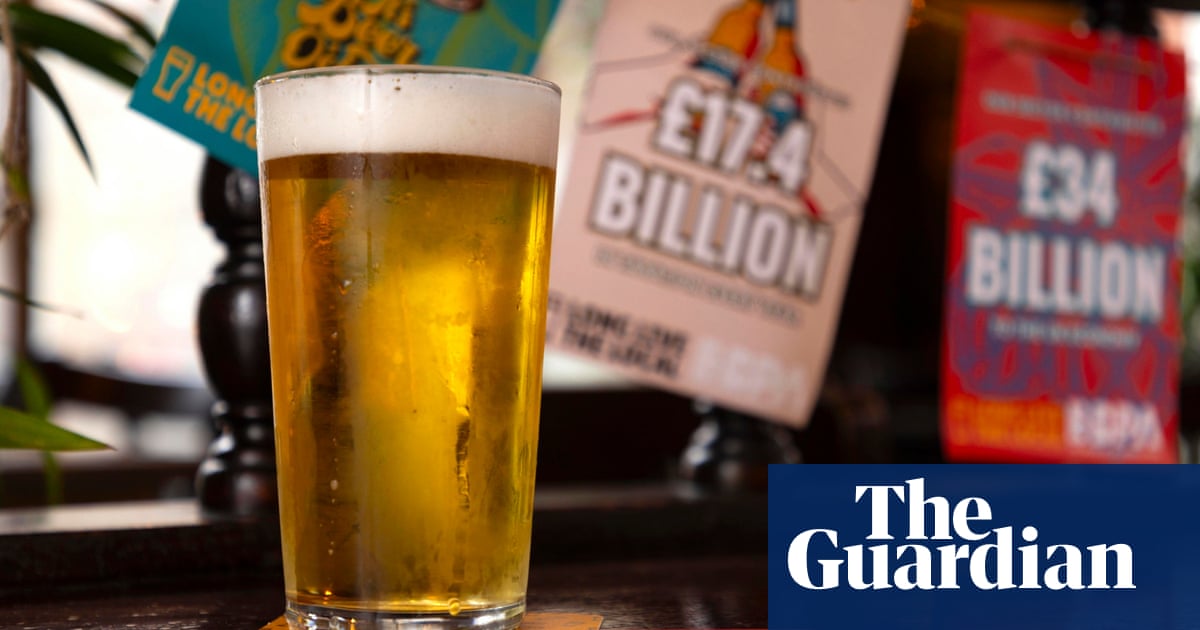
Instead of replacing the pub pint measure it might be better to offer more choice to customers (The power of the pint: is it time to retire one of the world’s biggest beer measures?, 24 April). Pubs and bars could offer customers four measures as choices. A one‑third pint referred to as a small; a half‑pint referred to as a half; a two-thirds-ish pint referred to as a large; and a traditional pint.
The purists have what they demand and can still ask someone out for a pint. The trendy types will have a new reason to go out and frequent pubs, though they will continue to ask someone if they fancy a beer. Everyone is happy with having more choice and, hopefully, a struggling business sector could get a boost.
Pat Fitzgerald
Polegate, East Sussex
I write in response to the letter by the esteemed chair of the UK metric association (Cheers! Here’s to the end of the pint, 22 September), a group that has been a constant thorn in my side ever since I started the 100% real, and not at all made up just now, Imperial Empiricalist Group.
On my discovery of his claim that “beer is the only liquid still sold in imperial units”, I jumped 1.8288 metres out of my chair. Lest the good doctor forget, milk is a liquid and, as far as I know, sells quite well. I’m sure he has happily proclaimed that he is popping down the shop for 1.13 litres of semi-skimmed before jumping in his car to drive the 1.609344km (give or take) to his nearest shop, perhaps on the way stopping by the Society for Pointless Nomenclature Arguments or the College of Specious Reasoning.
Jacob Elliott
Hornsey, London
Dr Peter Burke states that the proposed two-thirds pint measure doesn’t even have a name. I suggest that such a measure be called a “Starmer”, on the grounds that it is already unpopular and is unlikely to be around for long.
Michael Hunt
Datchet, Berkshire
May I suggest that the new measure be called the Ryle? This after the Oxford philosopher Gilbert Ryle who, as Charlotte Vrijen tells us in her PhD dissertation: “… gave his name to a measure of beer, roughly three‑quarters of a pint”. Christ Church had special glasses made for these “Ryles of beer”. He used to say that sometimes half a pint was too small a measure and a pint too large. Once he stated that he would prefer to be remembered for having invented a measure of beer than for having written The Concept of Mind.
Alec McHoul
Mundijong, Perth, Australia
Women of my generation were often refused a pint in pubs in the 1970s and early 80s, something I never forget when ordering a beer. I also have some sympathy with the old man in George Orwell’s Nineteen Eighty-Four, who observed: “A ’alf‑litre ain’t enough. It don’t satisfy. And a ’ole litre’s too much. It starts my bladder running.” As we all know, Orwell knew his beer.
Liz Fuller
London
375ml is almost exactly the same as two-thirds of a pint. It’s nicely metric, so would that satisfy Dr Peter Burke? And it’s the same volume as a half bottle of wine. I’d go for that.
Godfrey Keller
Department of Economics, University of Oxford
Should the authorities decide to go with the “diminishing pint” strategy, the poor old Great British Punter will yet again be feeling the rough end of the ragman’s trumpet. Will the price of a pint go down? No way – we’ll be paying the same price for a significantly smaller amount. This is Britain, after all. Disgruntled of Yorkshire.
Steven Garland-Grimes
Yeadon, West Yorkshire
The UK plans to drop the pint measure but we’ve only just achieved the (only) Brexit gain … of buying a pint … of wine!
Alistair Cant
Edinburgh
While I have been able to order a schooner of beer since 2011 in the UK, I have refrained from ordering a clipper of sherry. I dread the piratical look on the publican’s face.
Tom Brown
Newbury, Berkshire
They’ll never change the beer measurement. It affects so much more than the amount of beer. It’s in the language and the British psyche. Can you really imagine anyone saying: “Come on, shall we go for two-thirds of a pint?” The pint of beer resonates with solace, friendship and so much more.
Jeanette Hamilton
Buxton, Derbyshire
As UK ale and lager servings have has been marketed at ever greater strength since the 1970s, perhaps associated health problems could be alleviated by weakening the drink rather than reducing the container.
Martin James
Haslemere, Surrey